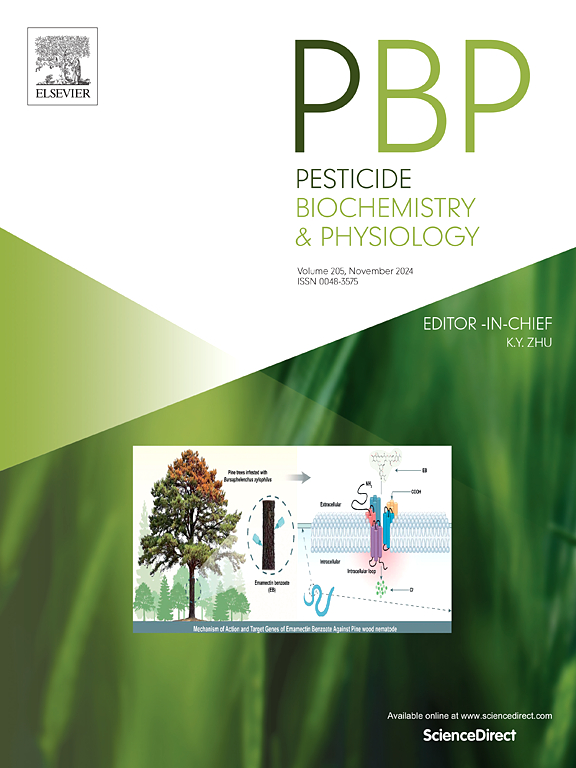采后一氧化氮处理通过调节活性氧稳态、苯丙酸代谢和s -亚硝基化水平提高生姜抗病性
IF 4
1区 农林科学
Q2 BIOCHEMISTRY & MOLECULAR BIOLOGY
引用次数: 0
摘要
一氧化氮(NO)是一种广泛应用于果蔬的防腐剂,能有效延长果蔬的保质期,提高抗病性。枯萎病(F. solani)引起软腐病,严重影响生姜的质量和产量。因此,生姜采后病害的防治是必要的。本研究采用1 mM硝普钠(SNP, NO供体)研究采后生姜感染梭兰氏菌后的抗病能力。结果表明,NO能抑制茄蚜在生姜中的进一步侵染,并能直接抑制茄蚜的体外生长。NO降低了茄蚜的危害,激活了抗病酶的活性,增加了抗氧化剂和苯丙氨酸代谢物的含量。此外,NO增加了内源NO水平和SNO含量,下调了GSNOR活性和转录表达,提示s -亚硝基化可能参与了NO增强生姜抗病能力的过程。因此,NO通过调节活性氧稳态、苯丙酸代谢、内源NO含量和s -亚硝基化水平增强生姜对茄蚜的抗性。因此,NO处理有利于提高生姜贮藏期的抗病性。本文章由计算机程序翻译,如有差异,请以英文原文为准。

Nitric oxide postharvest treatment improves disease resistance in ginger by regulating ROS homeostasis, phenylpropionic acid metabolism and S-nitrosylation levels
Nitric oxide (NO), as a widely used preservative for fruit and vegetables, can effectively extend shelf life and improve disease resistance. Fusarium solani (F. solani) causes a soft rot that seriously impacts the quality and production of ginger. Thus, control of diseases in postharvest ginger is necessary. In this study, 1 mM sodium nitroprusside (SNP, NO donor) was used to explore the disease resistance of postharvest ginger after infection with F. solani. We found that NO inhibited further infestation of F. solani in ginger and had a direct inhibition of F. solani growth in vitro. NO reduced the damage of F. solani, activated the activity of disease-resistant enzymes, increased the content of antioxidants and phenylalanine metabolites. Besides, NO increased endogenous NO level and SNO content and down-regulated GSNOR activity and transcriptional expression, implicating that S-nitrosylation might be involved in NO-enhanced disease resistance in ginger. Thus, NO enhances the ginger resistance against F. solani by regulating ROS homeostasis, phenylpropionic acid metabolism, endogenous NO content and S-nitrosylation level. Thus, NO treatment was found to be beneficial in improving disease resistance in ginger during storage.
求助全文
通过发布文献求助,成功后即可免费获取论文全文。
去求助
来源期刊
CiteScore
7.00
自引率
8.50%
发文量
238
审稿时长
4.2 months
期刊介绍:
Pesticide Biochemistry and Physiology publishes original scientific articles pertaining to the mode of action of plant protection agents such as insecticides, fungicides, herbicides, and similar compounds, including nonlethal pest control agents, biosynthesis of pheromones, hormones, and plant resistance agents. Manuscripts may include a biochemical, physiological, or molecular study for an understanding of comparative toxicology or selective toxicity of both target and nontarget organisms. Particular interest will be given to studies on the molecular biology of pest control, toxicology, and pesticide resistance.
Research Areas Emphasized Include the Biochemistry and Physiology of:
• Comparative toxicity
• Mode of action
• Pathophysiology
• Plant growth regulators
• Resistance
• Other effects of pesticides on both parasites and hosts.

 求助内容:
求助内容: 应助结果提醒方式:
应助结果提醒方式:


